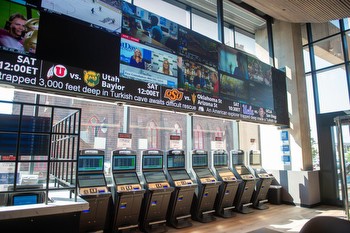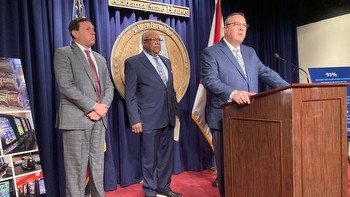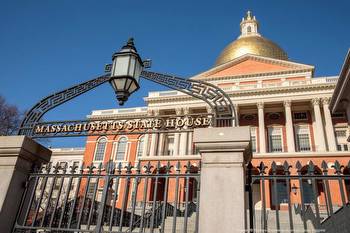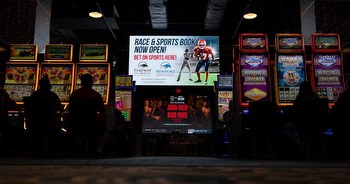R.I. fears missing out on sports betting revenue. Is it prepared to address problem gambling?
Rhode Island lawmakers look across state lines to Massachusetts and Connecticut to see how they enacted sports betting, and all they see are dollar signs.
In just the first month after sports betting began in Massachusetts, the Bay State saw more than $568 million worth of bets placed and nearly $12 million in tax revenue. Connecticut, which legalized sports betting in 2021, saw roughly $103 million in online bets placed and $9.5 million in revenue in the same period.
Rhode Island’s two neighbors both allow bets placed on their college football, basketball, and hockey teams when they’re in tournament play. Rhode Island does not. Even though Rhode Island was the first of the New England states to legalize sport wagering in 2018, it only allows bets on professional teams like the Celtics and Patriots.
That means the smallest state is missing big money. As the legislative session winds down, the General Assembly is poised to pass bills that would allow bets on Rhode Island’s collegiate teams when they are participating in tournaments that consist of four or more teams like March Madness. Wagering on individual collegiate players is prohibited under the legislation.
But while lawmakers may see more revenue, gambling researchers see a new pathway to addiction for the state’s young adults.
“Sports betting is a whole new ballgame with potential increases to problem gambling,” said Patrick Kelly, a professor of accountancy at Providence College who studies gambling.
Calls and chats to Connecticut’s problem gambling hotline tripled in the first six months after the sports betting took effect in October 2021, Kelly found in results that appear in an unpublished paper.
Yet the two bills the General Assembly is considering make no reference to funding toward problem gambling prevention and treatment, Kelly said.
Senate spokesperson Greg Pare said “treatment programs already exist, and Senate Bill 3, which only applies to local college teams participating in tournaments, presents a very minor change.”
Pare added that expanded resources for problem gaming are included in the General Assembly’s separate iGaming bill, which was passed by the Senate on June 8. The legislation requires that the state’s casinos in Lincoln and Tiverton must offer programming such as the promotion of player self-exclusions and the gambling hotline.
The casinos must also reimburse the State Lottery Division no less than $200,000 each year for compulsive and problem gambling programs and up to $150,000 in forfeited winnings toward the Rhode Island Council on Problem Gambling.
The House and Senate versions of the sports betting expansion bill were passed out of the House Finance Committee in a 11-1 vote on June 8. The Senate passed its version 33-4 in March. The bills now head to the House floor for consideration.
Last month, Rhode Island Lottery Director Mark Furcolo told state fiscal analysts that the Ocean State saw revenue from sports wagers dropped more than 10% since sports betting apps went live in Massachusetts. According to lottery data, revenue dropped nearly $1 million between March and April of this year.
“Ultimately, when residents of our state seek to place wagers during college tournaments, we shouldn’t be forcing them to go to Massachusetts or Connecticut,” Ruggerio said in a statement following his bill’s passage in the Senate in March. “We want to keep those fans, and those dollars, here at home.”
In 2019, Kelly recalled the president of the National Council on Problem Gambling predicting an increase in 10,000 problem gamblers in Rhode Island based on the state’s population of nearly 1.1 million people. Estimates put the prevalence of problem gambling at around 1% of the U.S. population.
“That number is concerning,” Kelly said. “Every problem gambler can negatively impact six other people.”
Dr. Rachel Volberg, a gambling researcher at UMass Amherst, said her own research found that the rate of problem gambling is higher among sports betters than among the general population.
“Sports betters tend to be pretty enthusiastic gamblers,” she said. “And they’re often involved in a broad range of gambling.”
Kelly said this gateway to problem gambling is especially prevalent among men ages 18 to 35. What draws younger people to sports betting, he said, is that they think it is more skill-based than luck.
“You don’t have people from 20 to 30 going into a casino and spending five hours at a slot machine,” Kelly said. “But they’ll bet on their phone.”
Team loyalty is also a draw to sports betting.
“Young men frequently play these sports and become enthusiastic sports fans for their respective teams,” Kelly said. “Sports betting companies have been very effective at marketing to these sports fans.”
Kelly said while the state’s bills prohibit bets on individual players, that’s not enough.
“Sports betting is still relatively new, there will be scandals in the next five to 10 years” he said. “There’s too much money and too much involvement.”
Thorr Bjorn, athletic director for the University of Rhode Island, would prefer the state keep its colleges protected by not expanding sports betting. Players would also feel worse over errors committed during big games.
“It takes off some of the local pressure our student-athletes may feel,” he said. “I think that was a good situation.”
Should the legislation move forward, Bjorn said it is imperative that universities educate college athletes on the impacts of gambling or how to handle situations that may not be compliant with the National Collegiate Athletics Association.
“We need to do more,” he said. “We’d really love to get some experts to come in and talk to students about impact — there are a lot of people who have had difficult experiences because of betting.”
Want to share this story? to purchase a link that allows anyone to read it on any device whether or not they are a subscriber.
